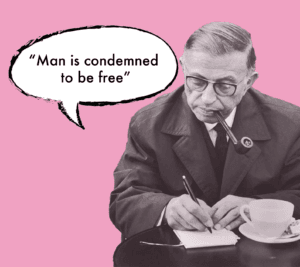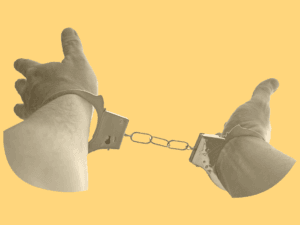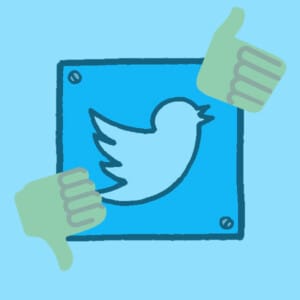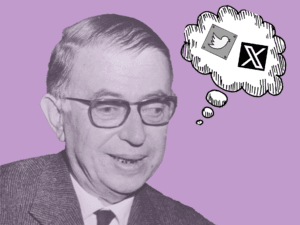Estimated reading time: 4 minutes
by Dr Jim Walsh, CEO of Conway Hall
Should I leave Twitter?
From my perspective Twitter (or X) is a tricky space and has changed over the years. I am also more than aware of the various running battles that many others have had on the platform. One of the key differences I have witnessed is the lack of engagement that ‘non-political’ tweets are now getting. As a consequence, it feels like a very fraught environment these days but, perhaps strangely, so many decent people and organisations still using it. Maybe I need to think of it as something more like a medieval square with lots of raucous and diverse opinions? With crosstalk abounding from every echelon of society that doesn’t ever gain any traction beyond the immediate hurl. But on the other hand, I also see the dedicated work of individuals / groups / associations campaigning to make the world a better place… Oh, the dilemma…
Let’s re-think.
If Jean-Paul Sartre were alive today, would he be on Twitter? Probably. He was a great campaigner and freedom fighter. He vehemently opposed the official French stance in the Algerian War and strenuously desired international unity in the shadow of nuclear escalation in the 1960s, amongst many other campaigns, statements, positions, and messages of support. Yes, Sartre would have definitely chosen to be on Twitter. His voice and reason could go direct to those he supported and equally those he opposed.
So, if Twitter – I speculate – would have been good enough for Sartre, then what’s my problem? Surely, I should just get on with it? Thinking of Sartre, though, throws up a deeper issue for me than, dare I say, Twitter. Should I ask for advice in the first place regarding my dilemma?
On that score, I am even more certain about Sartre’s view than whether he would have used Twitter. He would have called me a “coward”. A bit extreme, you might think, but not as extreme as what he called others.
The reason I would be labelled a coward is because, in Sartre’s eyes, I am not courageously embracing my freedom, nor taking responsibility, nor choosing for myself. I should not be hiding behind an online poll – it hasn’t got to that stage by the way – or finding excuses as to my prevarication. No, instead I should act. As he saw it (and apologies for the gendered phrasing), “Man is condemned to be free” and that means we should go forth and invent ourselves through our actions. As far as he was concerned it is a given that we are free to be ourselves and make our own life choices. Although, he also recognised that we might not always have the total freedom to act as we might wish, due to our life situation or circumstances. This is sometimes understood by the phrase “freedom from” and whether or not there are certain elements beyond our control. That said, there has been no stronger voice in the whole of history to champion the other type of freedom where we have the “freedom to” respond how we choose to those elements life throws in our direction.

So, as regards my dilemma, I am free to choose and, if I follow Sartre, I should stop being a coward and choose for myself. Your advice on the matter, although initially appealed for, I am afraid, on reflection, I need to pass over. Thank you, but no thank you. I need to make my decision and by so doing take full responsibility for that decision. I mean, imagine if I did conduct an online poll and the results dictated that I should stay on Twitter and then I received a truckload of anxiety provoking horrendous tweets. Clearly it would be wrong of me to blame those who voted for me to stay for any subsequent outrage that might appear on Twitter. Now, that kind of blaming and abdication of responsibility really would be cowardice. Hmm, it seems Sartre hit the nail on the head with his term.
Interestingly the other extreme term he used is reserved purely for those who deem their existence necessary. These ‘necessary’ people he delighted in referring to as “scum”. Now, that is extreme and not usual amongst philosophers. We’re normally, as a breed, far more polite. Sartre, though, eschewed being polite when he deemed important issues were at stake. Invariably a good portion of those Sartre potentially considered with his extreme term were religious leaders who understood their existence to be necessary to act as guiding hands to their flock or those who believed they had been sent to deliver or enact a divine entity’s purpose. Others might be of a more secular bent exhibit a form of self-power fixation… Lots of serial killers would fall into this category.

The more relevant issue for Sartre, though, was not the division between the two terms but rather that our existence as a species is accidental. This meant for Sartre that we can’t default to a set of instructions or code of conduct or expect to be guided by a more superior being. Instead, for him, we have to look to ourselves for how we might act in this world of ours and then accept full responsibility for those actions. This is the Humanism he wanted to convey in Existentialism and Humanism. Sartre saw only chains when thinking about religion and only liberation when thinking about humans.
Incidentally, right at the end of Existentialism and Humanism Sartre very succinctly addressed one of the main criticisms of existentialism which still bizarrely flourishes to this day – that existentialism is the philosophy of angst-ridden despair. As he corrects “… existentialism is optimistic, it is a doctrine of action, and it is only by self-deception, by confusing their own despair with ours that Christians can describe us as without hope.”

